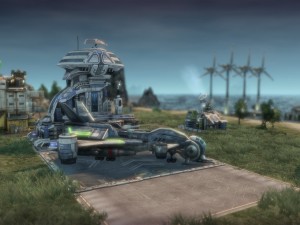Realism vs. fun
During my ongoing literature review I often discover interesting facts about things I’ve never thought about. Sometimes I can connect these facts with my own observations: The result is mostly a completely new idea why things are as they are. Maybe these ideas are new to you, too. Therefore I’ll share my new science based knowledge with you!
This week: This time, I discuss the problem of creating a realistic simulation to raise the general attention for global problems. A too realistic game might cause more confusion than a more simple approach.
I’m currently thinking about games, that help us to understand global problems like polution or overfishing. Anno 2070[1] is a good example how to present our own influences on our environment. The player can choose between the Eco and the Tycoon fraction. The Eco fraction tries to save the environment and uses only „green energy“, whereas the Tycoon fraction doesn’t care about the environment and is able to build coal-fired power plants. Over time, this playstyle changes the environment of the game.
The player settles on an untouched island and starts to build his city. If the player cares for the environment, the nature around the own buildings looks healthy and green. However, if the player takes the Tycoon-style approach, the nature becomes unhealthy and the whole island starts to look wasted.
Apart from the constant influences on the environment, the player has also to face catastrophes like a fire on an oil rig. If the player doesn’t stop the fire in time, oil can leak out and polute the oceans. The player is armed with enough countermeasure tools to clean the oceans but players of the Tycoon fraction might not care about the polution because they’re not as punished as the Eco fraction for living in a poluted environment.
This approach of Anno 2070 to make us more sensible towards environmental problems is a good step towards a broader understanding of the global problems. Players can experience the different impact of building a coal-fired power plant or a solar array power station.
On the other hand, Anno 2070 is just a computer game and the main goal of a game is entertainment. Changing the environment is pretty easy and most of the polution is just gone away after the „dirty“ buildings are replaced. Although recovering the nature is easy, the general concept of the game helps its players to think more about the global problems.
A more realistic approach might help to develop a deeper understanding of these global problems. However, this isn’t as easy as it sounds, because realistic approaches need to take into account a lot of new variables. All these variables need to be simulated and also to be controlled and influenced by the player. A new player would be easily overwhelmed by all the important features and it might frustrate the player.
The simulation genre lives from simulating realistic facts. However, in most cases, the game simulates only one single topic. A flight simulator has only a limited amount of variables, that need to be simulated. Same goes for a racing simulation game. These variables are also well defined and can be easily implemented in a game.
Complex things like the global problems however do have almost unlimeted variables, which influence the outcome. Different laws to protect the environment and different approaches of the consumers towards their products are often the key factores. The product should be cheap, which forces the industry to produce very efficient. Efficient production often leads to a higher degree of polution. Additionally, businesses want to increase their revenue and „green“ production is expensive.
If it’s somehow possible to gather all the different variables and to create a simulation out of them, then the simulation would be very complex and the player needs to understand all the influences of each variable to successful play the game. In the end, a game, which should help to raise the attention for global problems in an entertaining way, will cease being a game and frustrate the player. One could argue that this frustration might also lead to a deeper understanding of the complexity of this problem, but in the end most players would only be confused about all the different variables and connections.
In conclusion, a game like Anno 2070 with only a simple simulation of environmental changes caused by polutions could be more helpful to understand global problems than a complex hardcore simulation. On the other hand, if a player has developed a basic understanding of the problem, a hardcore simulation that helps to understand every detail might be a good step as well.
